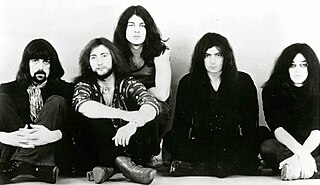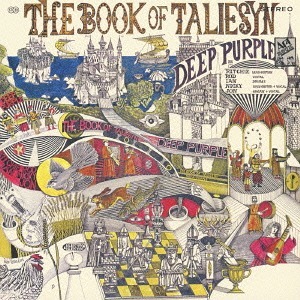Fandango is a term that originally described a style of folk dance and music.
Contents
Fandango may also refer to:
Fandango is a term that originally described a style of folk dance and music.
Fandango may also refer to:

Deep Purple are an English rock band formed in London in 1968. They are considered to be among the pioneers of heavy metal and modern hard rock, although their musical style has varied throughout their career. Originally formed as a psychedelic rock and progressive rock band, they shifted to a heavier sound with their 1970 album Deep Purple in Rock. Deep Purple, together with Led Zeppelin and Black Sabbath, have been referred to as the "unholy trinity of British hard rock and heavy metal in the early to mid-seventies". Listed in the 1975 Guinness Book of World Records as "the globe's loudest band" for a 1972 concert at London's Rainbow Theatre, they have sold over 100 million records worldwide.
A music video is a video that integrates a song or an album with imagery that is produced for promotional or musical artistic purposes. Modern music videos are primarily made and used as a music marketing device intended to promote the sale of music recordings. These videos are typically shown on music television and on streaming video sites like YouTube, or more rarely shown theatrically. They can be commercially issued on home video, either as video albums or video singles. The format has been described by various terms including "illustrated song", "filmed insert", "promotional (promo) film", "promotional clip", "promotional video", "song video", "song clip", "film clip", "video clip", or simply "video".

Duran Duran are an English pop rock band formed in Birmingham in 1978 by singer Stephen Duffy, keyboardist Nick Rhodes and guitarist/bassist John Taylor. With the addition of bassist Simon Colley and drummer Roger Taylor the following year, the band went through numerous personnel changes before May 1980, when they settled on their most famous line-up by adding guitarist Andy Taylor and lead vocalist Simon Le Bon.
Swing or swinging may refer to:

ABC is an English pop band that originated in Sheffield in 1980, evolving from the earlier ensemble Vice Versa. The band's classic formation featured Martin Fry as the lead vocalist, Mark White on guitar and keyboards, Stephen Singleton playing the saxophone, and David Palmer behind the drums.

Eurythmics were a British pop duo formed in 1980, consisting of Scottish vocalist Annie Lennox and English musician and producer Dave Stewart. They were both previously in the Tourists, a band that broke up in 1980. They released their first studio album, In the Garden, in 1981 to little success, but achieved global acclaim with their second album, Sweet Dreams (1983). The title track became a worldwide hit, reaching number two in the UK Singles Chart, and number one in Canada and the US Billboard Hot 100. Eurythmics went on to release a string of hit singles and albums, including "Love Is a Stranger", "There Must Be an Angel " and "Here Comes the Rain Again", before splitting in 1990.

Nicholas John Simper is an English bass guitarist, who was a co-founding member of Deep Purple and Warhorse. In the 1960s, he began his professional career in bands such as Johnny Kidd & the Pirates, The Flower Pot Men, and Lord Sutch's Savages.

Lisa Jane Stansfield is an English singer, songwriter, and actress. Her career began in 1980 when she won the singing competition Search for a Star. After appearances in various television shows and releasing her first singles, Stansfield, along with Ian Devaney and Andy Morris, formed Blue Zone in 1983. The band released several singles and one album, but after the success of Coldcut's "People Hold On" in 1989, on which Stansfield was featured, the focus was placed on her solo career.
Headhunter or head hunter may refer to:

Wang Chung is an English new wave band, formed in London in 1980 by Nick Feldman, Jack Hues and Darren Costin. The name Wang Chung is Chinese, meaning "yellow bell" in English, and is the first note in the Chinese classical music scale. The band found their greatest success in the US, with five top 40 hits there, all charting between 1983 and 1987, including "Dance Hall Days", "Everybody Have Fun Tonight" and "Let's Go!".
The Outsiders may refer to:

Shades of Deep Purple is the debut album by the English rock band Deep Purple, released in July 1968 on Tetragrammaton in the United States and in September 1968 on Parlophone in the United Kingdom. The band, initially called Roundabout, was the idea of former Searchers drummer Chris Curtis, who recruited Jon Lord and Ritchie Blackmore before leaving the project. The Mk. I line-up of the band was completed by vocalist/frontman Rod Evans, along with bassist Nick Simper and drummer Ian Paice, in March 1968.

Deep Purple, also referred to as Deep Purple III, is the third studio album by the English rock band Deep Purple, released in June 1969 on Tetragrammaton Records in the United States and only in September 1969 on Harvest Records in the United Kingdom. Its release was preceded by the single "Emmaretta" and by a long tour in the UK, whose dates were interspersed between the album's recording sessions.

The Book of Taliesyn is the second studio album by the English rock band Deep Purple, recorded only three months after Shades of Deep Purple and released by Tetragrammaton Records in October 1968, just before their first US tour. The name for the album was taken from the 14th-century Book of Taliesin.
Beauty and the Beast is a traditional fairy tale.
Front line refers to the forward-most forces on a battlefield.

Russell Glyn Ballard is an English musician.

"Sweet Dreams (Are Made of This)" is a song by British synth-pop duo Eurythmics. It was released as the fourth and final single from their second album of the same name in January 1983. It was their breakthrough hit, establishing the duo worldwide. It reached number two on the UK Singles Chart in March 1983, and number one on the US Billboard Hot 100 six months later; it was their first single released in the US.
Wow, WOW or WoW may refer to:

"Come Dancing" is a 1982 song written by Ray Davies and performed by British rock group the Kinks on their 1983 album State of Confusion. The song was inspired by Davies' memories of his older sister, Rene, who died of a heart attack while dancing at a dance hall. The lyrics, sung from the perspective of an "East End barrow boy," are about the boy's sister going on dates at a local Palais dance hall.